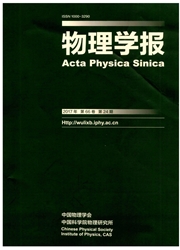

 中文摘要:
中文摘要:
对于磁性氧化物的磁有序,传统的观点用超交换相互作用(SE)和双交换相互作用(DE)模型进行解释,其出发点都建立在全部氧离子是-2价的基础上.例如,对于LaMnO_3,认为其中的La和Mn都处于+3价,用SE模型解释相邻Mn^(3+)离子间的反铁磁序;当以二价的Sr离子替代一部分La离子后,认为等量的Mn^(3+)离子变为Mn^(4+)离子,用DE模型解释相邻Mn^(3+)和Mn^(4+)离子间的铁磁序.然而,事实上在氧化物中存在一部分负一价氧离子.Cohen[Nature 358 136]利用密度泛函理论计算了BaTiO_3的价电子态密度,结果得到只有Ba离子的化合价与传统观点相同,为+2价;而Ti和0分别为+2.89价和-1.63价,不是传统观点的+4价和-2价,但是与多年来关于氧化物电离度的研究[Rev.Mod.Phys.42 317]和X射线光电子谱(XPS)的研究结果相符合.本文经过不同热处理条件制备了名义成分为La_(0.95)Sr_(0.05)MnO_3的三个样品,通过对样品的XPS分析,发现样品中不存在Mn^(4+)离子,只存在Mn2+和Mn^(3+)离子,平均价态随热处理程序的增加而升高.尽管三个样品有相同的晶体结构,但磁矩明显不同.对于这样的性能,不能用SE和DE模型解释其磁结构.利用本课题组最近在研究尖晶石结构铁氧体磁有序过程中提出的O 2p巡游电子模型解释了这种现象,利用样品在10 K的磁矩估算出的Mn离子平均价态变化趋势与XPS分析结果一致.O 2p巡游电子模型的出发点建立在氧化物中存在一部分负一价氧离子的基础上,这是其与SE和DE模型的根本区别.
 英文摘要:
英文摘要:
In traditional views, the magnetic ordering of oxides may be explained using magnetic superexchange (SE) or double exchange (DE) interaction models. Both models are based on an assumption that the valences of all oxygen ions be -2. For example, both La and Mn in LaMnO3 are assumed to be trivalent, in which antiferromagnetic spin structure is explained using the SE interaction between Mn3+ cations mediated by oxygen anions. In La1-xSrxMnO3, there exists a part of Mn4+ cations with the content ratio of Mn4+/Mn3+ being x/(1 - x), in which spin structure and electronic transport properties are explained by DE interaction. However, there is a part of monovalent oxygen ions existing in oxides. Cohen [Nature 358 136] has calculated the densities of states for valence electrons in the perovskite oxide BaTiO3 using density functional theory. Results indicate that the average valence of Ba is +2, being the same as that in the traditional one, but the average valences of Ti and O are +2.89 and -1.63 respectively, agreeing with the results obtained using ionicity investigation [Rev. Mod. Phys. 42 317] and X-ray photoelectron spectra (XPS) analysis, but different from the conventional results +4 and -2. In this paper, three samples with the nominal composition La0.95Sr0.05MnO3 are prepared by different thermal-treatments. Likewise, there are only Mn2+ and Mn3+ cations, but no Mn4+ cations in .La0.95Sr0.05MnO3, a result obtained by XPS analysis, and the average valence of Mn in La0.95Sr0.05MnO3 samples increases with increaseing thermal-treatment. Although the crystal structures of the samples are the same, the magnetic moments per formula are obviously different. This magnetic structure cannot be explained using the conventional SE and DE interaction models. Using the O 2p itinerant electron model for spinel ferrites proposed recently by our group, we can explain this magnetic structure. The variation trend of the average valences of Mn cations calculated using the magnetic moments per form
 同期刊论文项目
同期刊论文项目
 同项目期刊论文
同项目期刊论文
 Investigation on cation distribution and magnetic properties in self?doped manganites La0.6-xSr0.4Mn
Investigation on cation distribution and magnetic properties in self?doped manganites La0.6-xSr0.4Mn Magnetic moment directions and distributions ofcations in Cr (Co) substituted spinel ferrites Ni0.7F
Magnetic moment directions and distributions ofcations in Cr (Co) substituted spinel ferrites Ni0.7F Experimental evidence for the magnetic moment directions of Cr2+ and Cr3+ cations in the spinel ferr
Experimental evidence for the magnetic moment directions of Cr2+ and Cr3+ cations in the spinel ferr Investigation of magnetic ordering and cation distribution in the spinel ferrites CrxFe3-xO4 (0.0 &l
Investigation of magnetic ordering and cation distribution in the spinel ferrites CrxFe3-xO4 (0.0 &l Cation distributions estimated using the magnetic moments of the spinel ferrites Co1-xCrxFe2O4 at 10
Cation distributions estimated using the magnetic moments of the spinel ferrites Co1-xCrxFe2O4 at 10 Evidence from infrared spectra for the magnetic moment directions of Cr cations in the spinel ferrit
Evidence from infrared spectra for the magnetic moment directions of Cr cations in the spinel ferrit Investigation on the maximum content of vacancy at the B sites in La0.75Sr0.25Mn1-xO3 perovskite man
Investigation on the maximum content of vacancy at the B sites in La0.75Sr0.25Mn1-xO3 perovskite man Growth and thermoelectric properties of Ca3Co4O9 thin films with c-axis parallel to Si substrate sur
Growth and thermoelectric properties of Ca3Co4O9 thin films with c-axis parallel to Si substrate sur 期刊信息
期刊信息
